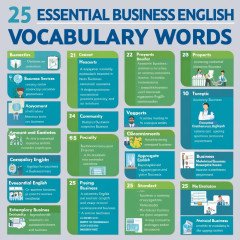English Learning Tips
English Learning Tips

25 Essential Business English Vocabulary Words to Boost Your Professional Communication
In today’s globalized world, effective communication is a key skill for success in any business environment. Whether you’re engaging in meetings, writing emails, or negotiating contracts, knowing the right business English vocabulary can help you sound more professional and confident. If you want to stand out in the workplace and enhance your career prospects, mastering these 25 essential business English words is a great place to start.
Accountability refers to the responsibility for one’s actions or decisions, especially in a business context. It is crucial for building trust and ensuring that everyone meets their obligations in the workplace.
Revenue is the income generated from business activities, such as sales of products or services. Understanding how revenue impacts a company’s financial health is key for any business professional.
Collaboration involves working together with others to achieve common goals. Effective collaboration can lead to better results, innovation, and a positive work culture.
A deadline is a time by which a task or project must be completed. Meeting deadlines is a critical aspect of business success, ensuring projects stay on track and customers’ needs are met.
Stakeholders are individuals or groups that have an interest in the company’s performance, such as employees, customers, investors, and suppliers. Understanding stakeholders' needs is crucial for business growth.
A strategy is a plan of action designed to achieve specific business goals. A well-thought-out strategy can help a business stay competitive and reach its objectives.
Profit margin refers to the percentage of revenue that exceeds the costs of running a business. It is a key indicator of a company’s profitability and financial efficiency.
Negotiation is the process of discussing terms and reaching an agreement. Strong negotiation skills are essential for closing deals and fostering long-term business relationships.
Innovation involves introducing new ideas, methods, or products. In today’s rapidly changing business landscape, companies must focus on innovation to stay relevant and competitive.
Efficiency refers to the ability to complete tasks with minimal waste of time, effort, or resources. Improving efficiency in the workplace can lead to cost savings and higher productivity.
Market share is the percentage of total sales in a market that a company controls. Increasing market share is often a sign of business growth and dominance within an industry.
Scalability is the ability of a business to grow and manage increased demand without compromising performance. A scalable business model is vital for long-term success and expansion.
Leadership is the ability to guide, motivate, and inspire a team towards achieving common goals. Strong leadership is crucial for fostering collaboration and driving business success.
Sustainability refers to conducting business in a way that is environmentally responsible and socially beneficial. Companies that prioritize sustainability can improve their reputation and long-term viability.
Branding is the process of creating a unique identity for a company or product. A strong brand can help a business differentiate itself from competitors and build customer loyalty.
Budgeting involves planning and managing financial resources. Effective budgeting helps businesses allocate funds efficiently, monitor expenses, and ensure profitability.
KPIs are measurable values that indicate how effectively a company is achieving its business objectives. Monitoring KPIs helps businesses track progress and make informed decisions.
Networking is the process of building and maintaining professional relationships. Strong networks can lead to new business opportunities, partnerships, and career growth.
ROI measures the profitability of an investment relative to its cost. A positive ROI is crucial for justifying business expenditures and ensuring financial success.
Outsourcing involves contracting external organizations to perform tasks that would otherwise be handled in-house. It is commonly used to reduce costs and focus on core business activities.
B2B refers to transactions or relationships between two businesses. Understanding B2B dynamics is essential for companies that provide services or products to other businesses.
B2C describes the transaction between a business and individual consumers. Companies in this sector focus on meeting the needs of customers directly through marketing and sales strategies.
Diversity in business refers to the inclusion of individuals from different backgrounds, cultures, and experiences. A diverse workforce can lead to improved creativity, problem-solving, and business performance.
Customer retention is the ability of a business to retain customers over time. Effective customer retention strategies help businesses build loyalty and reduce churn.
Agility in business refers to the ability to adapt quickly to changing market conditions and customer demands. Agile businesses are more resilient and can respond to challenges effectively.
Mastering these 25 business English vocabulary words will significantly improve your communication skills and increase your professional confidence. By understanding these terms and incorporating them into your daily business interactions, you’ll enhance your ability to work efficiently, build stronger relationships, and drive business success. Whether you’re negotiating deals, managing projects, or presenting to clients, using the right vocabulary can help you convey your ideas clearly and effectively, positioning you as a valuable asset in any workplace.
English Learning Tips
Read widely and regularly
How to Improve Your English Vocabulary Every Day